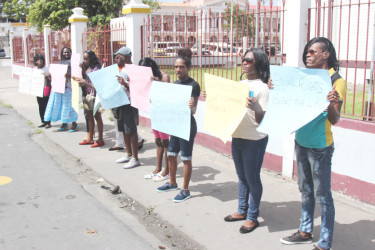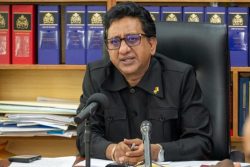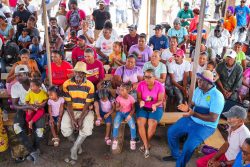Transgender persons aren’t trying to impose themselves on society, they are just trying to be part of it, according to Quincy McEwan, known as Gulliver, the Director of Guyana Trans United (GTU).
“It’s not about imposing,” Gulliver said on Thursday during a Brunch Talk at the National School of Music that coincided with the observance of the International Transgender Day of Visibility.
Gulliver, who noted the discrimination trans persons receive when using public transportation, with individuals going so far as to spit on them, was responding to a question posed about the view that trans-persons are trying to impose their rights on others.

“It’s about taking public space for who you are, and that is one of the things—actually being a human being and having equal rights like every other person…We’re Guyanese and we ought to enjoy the rights like any other Guyanese person,” she added.
The talk, organised by the Society against Sexual Orientation Discrimination (SASOD) and the USAID’s Advancing Partners and Communities (APC) Guyana Project, addressed an incident which occurred at the Georgetown Magistrates’ Courts last week, when a transgender female was barred from entering the courtroom of the sitting magistrate Dylon Bess for cross-dressing.
The litigant, David Bissoon, known as “Twinkle,” had been disallowed from entering Bess’ courtroom on three separate occasions, and on the third occurrence, she, along with other members of the LGBT community took to the streets to protest what is purported to be a discriminatory stance taken by the magistrate.
Twinkle’s matter, which was subsequently dismissed, stemmed from an incident where she was attacked with a beer bottle by a man in a minibus. When she proceeded to the police outpost to report the matter, he attacked her again, but that time she managed to inflict injury on him in self defence. Twinkle, who is a peer educator and a member of GTU, said that although the matter has been dismissed, she is not yet satisfied and the movement will not stop there.

James Bjorkman, Political and Economic Counselor attached to the United States Embassy, told those present for the talk that the narrative surrounding Lesbian, Gay, Bisexual and Transgender (LGBT) rights is false. “It’s not a fight for LGBT rights, it’s a fight for human rights. It’s not special rights, it’s not asking to be looked at differently from the rest of the community—it’s asking to be looked at as part of the community,” Bjorkman stated.
Joel Simpson, Co-chairperson of SASOD, agreed that the issue goes deeper than simply a matter of cross-dressing. For him, the deeper issue is the denial of a more specific kind of access to trans-people, whom he said tend to face a high degree of hate crimes and violence. “…Now we have a situation where an officer of the court is saying you can’t come to court as who you are. For me, the issue there is not even about cross-dressing, it’s about accessing justice.”
For Simpson, former Chief Justice Ian Chang’s ruling in 2013, in which he held that men and women are free to cross-dress in public as long as the reason for doing so is not improper, was a partial victory for transgender persons. “I think the Chief Justice’s decision is a partial victory, because the provision itself doesn’t say on the face of it that cross-dressing is not legal. So that’s what he did, he said, on the face of it, it’s not illegal, it’s not an offence to cross-dress, but the “but” is what became problematic…The term improper purpose is not defined in the legislation, there is no case law, no precedent as you say, which tells us what an improper purpose is, so in effect, what the Chief Justice has done, he’s read down the law for us,” he noted.
Simpson stated that an appeal court decision on the matter could either take the community backward or propel it forward and stated that the real remedy would be for the law to be repealed in Parliament. “The real remedy for this is for Parliament to repeal the law—to repeal these discriminatory laws—this one and the one criminalising same sex intimacy, so we’ll end this long battle of years and years in court…it is because of the failure of political leadership, the failure of Parliament to act that we’ve had to bring these cases to court,” he added.
In the meantime, however, while they await a change in legislation, he believes that community organisations who advocate for the rights of transgender persons can utilise the strategy of filing new claims and cases if persons continue to be barred from the courtroom. Simpson also mentioned that there were plans to engage with the legal fraternity during the course of next week to discuss the way forward.







